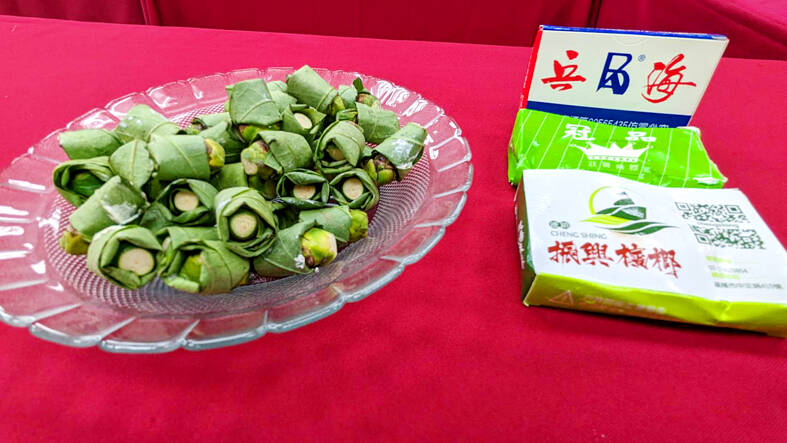More robust legislation, including higher fines, are required to stop betel nut vendors illegally selling to underage people, the Consumers’ Foundation said on Thursday, citing the results of its field tests.
The tests in Taiwan’s 22 administrative regions from July to last month collected data from 53 randomly selected betel nut stalls, foundation chairman Wu Jung-ta (吳榮達) told a media briefing at his office in Taipei.
The foundation sent a team with a young adult dressed in a high-school uniform to make purchases, Wu said.

Photo: Chen Wei-chi, Taipei Times
Of the 53 vendors, 30, or 56.6 percent, did not ask about age or check their ID before selling the team member betel nuts, he said.
In doing so, the vendors contravened Article 43 of the Protection of Children and Youths Welfare and Rights Act (兒童及少年福利與權益保障法), which prohibits supplying betel nuts to people aged under 18 and stipulates a fine of NT$10,000 to NT$100,000 (US$313.91 to US$3,139.12).
Betel nut kiosks in Pingtung, Yunlin, Hualien and Taitung counties, as well as in Keelung, failed the test by selling to the team member, while no vendors in Hsinchu City, Chiayi City, Tainan or Penghu County sold to the team, he said.
“Chewing betel nut is known to induce cancer and starting at a young age brings a higher risk of addiction,” Wu said. “It is a serious problem, as the government spends about NT$100 billion annually on cancer treatment and related costs, one-sixth of the National Health Insurance budget.”
The government should draft regulations specifically for the betel nut industry, including rules for where stalls can be set up and who can make purchases, he said, adding that fines should be increased to the levels of the Tobacco Hazards Prevention Act (菸害防制法).
“About 2 million people in Taiwan have a betel nut habit, which can lead to oral cancer, as well as dental problems,” said foundation financial officer Hao Sheng-po (侯勝博), who heads the otolaryngology department at Shin Kong Wu Ho-Su Memorial Hospital.
Betel nut is a stimulant that can lead to addiction, Hao said.
“It contains arecoline, arecaidine and n-nitrosamines, and releases oxyradicals and other toxins that can damage the respiratory system and lead to defects in the DNA,” he said. “It causes damage in the mouth and deformation of the teeth, and regular use for 20 years is associated with high risk of oral and esophageal cancer.”
In Taiwan, 8,000 people a year are diagnosed with oral cancer, with 3,000 dying annually, he said.
Foundation secretary-general Chen Ya-ping (陳雅萍) said that while regulations are meant to protect children, “the Control Yuan in a 2021 report reprimanded the Executive Yuan over a lack of effort to regulate sales and consumption of betel nut.”
“There has been no progress on the matter,” Chen said.
The government should enact regulations for the entire industry from betel nut plantations to distribution and sales, she said, adding that education and warnings are needed to establish a complete management system to safeguard the health of consumers.

An essay competition jointly organized by a local writing society and a publisher affiliated with the Chinese Communist Party (CCP) might have contravened the Act Governing Relations Between the People of the Taiwan Area and the Mainland Area (臺灣地區與大陸地區人民關係條例), the Mainland Affairs Council (MAC) said on Thursday. “In this case, the partner organization is clearly an agency under the CCP’s Fujian Provincial Committee,” MAC Deputy Minister and spokesperson Liang Wen-chieh (梁文傑) said at a news briefing in Taipei. “It also involves bringing Taiwanese students to China with all-expenses-paid arrangements to attend award ceremonies and camps,” Liang said. Those two “characteristics” are typically sufficient

A magnitude 5.9 earthquake that struck about 33km off the coast of Hualien City was the "main shock" in a series of quakes in the area, with aftershocks expected over the next three days, the Central Weather Administration (CWA) said yesterday. Prior to the magnitude 5.9 quake shaking most of Taiwan at 6:53pm yesterday, six other earthquakes stronger than a magnitude of 4, starting with a magnitude 5.5 quake at 6:09pm, occurred in the area. CWA Seismological Center Director Wu Chien-fu (吳健富) confirmed that the quakes were all part of the same series and that the magnitude 5.5 temblor was

The brilliant blue waters, thick foliage and bucolic atmosphere on this seemingly idyllic archipelago deep in the Pacific Ocean belie the key role it now plays in a titanic geopolitical struggle. Palau is again on the front line as China, and the US and its allies prepare their forces in an intensifying contest for control over the Asia-Pacific region. The democratic nation of just 17,000 people hosts US-controlled airstrips and soon-to-be-completed radar installations that the US military describes as “critical” to monitoring vast swathes of water and airspace. It is also a key piece of the second island chain, a string of

The Central Weather Administration has issued a heat alert for southeastern Taiwan, warning of temperatures as high as 36°C today, while alerting some coastal areas of strong winds later in the day. Kaohsiung’s Neimen District (內門) and Pingtung County’s Neipu Township (內埔) are under an orange heat alert, which warns of temperatures as high as 36°C for three consecutive days, the CWA said, citing southwest winds. The heat would also extend to Tainan’s Nansi (楠西) and Yujing (玉井) districts, as well as Pingtung’s Gaoshu (高樹), Yanpu (鹽埔) and Majia (瑪家) townships, it said, forecasting highs of up to 36°C in those areas